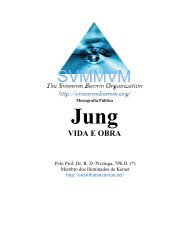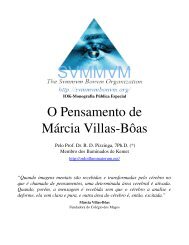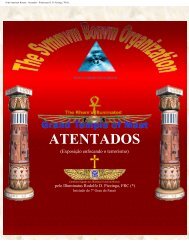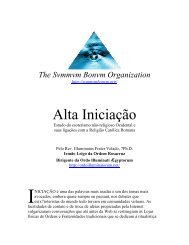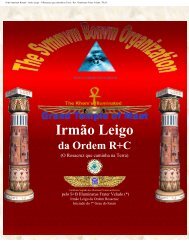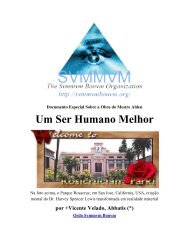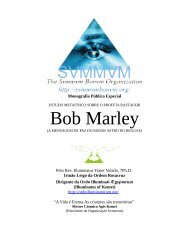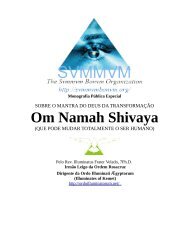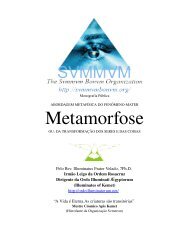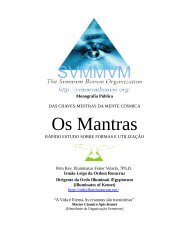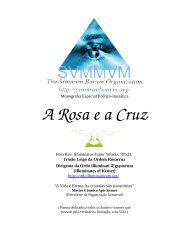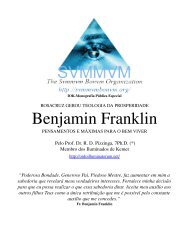History Of The Rose-Croix Sedir - Ordo Svmmvm Bonvm
History Of The Rose-Croix Sedir - Ordo Svmmvm Bonvm
History Of The Rose-Croix Sedir - Ordo Svmmvm Bonvm
You also want an ePaper? Increase the reach of your titles
YUMPU automatically turns print PDFs into web optimized ePapers that Google loves.
<strong>Rose</strong>ncreutz and it is ironical about the claim of the Brothers of the Rosicrucian brotherhood<br />
to reform the world *** At the same time a coarse lampoon: Appalling pactions made<br />
between the Devil and alleged Invisibles (1623) still increases on calumnies of Naudé.<br />
Under pretext of inform his readers about the " Invisible ones ", the anonymous author<br />
charges to the Brothers of the Rosicrucian brotherhood of the stories of assassinations,<br />
evocation of the devil, infernal oaths, the scenes of Sabbath with the presence of Astaroth,<br />
etc... *** the P. Jacques Gaultier, of the Company of Jesus, devoted to the Rosicrucian<br />
brotherhood a chapter of his Table chronographic book of Estat of Christianity since the birth<br />
from Christ, Lyon, 1633. He declares that the Rosicrucian brotherhood is " a kid of the<br />
Lutheranism, mixed by Satan of empiricism and of magic ". As for the P. François Garasse:<br />
<strong>The</strong> doctrines of the beautiful spirits of this Time or alleged such, Paris, 1624, it go until<br />
requiring for them the wheel and the gibet. *** Descartes was useful during some time in<br />
Germany in the army of prince Maurice de Nassau. It intended towards 1619 to speak<br />
about the Rosicrucian brotherhood and sought to enter in connection with them; but it did not<br />
find any. What did not prevent that on its return in France, 1623, it was intended to reproach<br />
for having enrôlé itself in said the company. It did not want however not to condemn them<br />
without being better indicated on their subject. Leibniz never regarded the Rosicrucian<br />
brotherhood but as one fiction. For him, the Chymiques Weddings are a novel where it<br />
deciphered a enigma whose word was: Alchimia. *** Let us mention Thomas Vaughan,<br />
whose pseudonym was Eugenius Philalethes. It had been born into 1622. It was<br />
supposed originating in Scotland. It studied in Oxford and had a great reputation of chemist<br />
and alchemist. It attempted to penetrate the secrecies of nature. It was called " philosopher<br />
of nature "; it was given for disciple of Henri Corneille Clutched and was prided on hostility<br />
at the place of Aristote and Descartes. Into 1652 it translated into English Fama and<br />
Confessio. Here how it is expressed in the introduction of this book: " I am able to affirm the<br />
existence and the reality of this admired dream, the Fraternity of the Rosicrucian<br />
brotherhood... " and, in the foreword: " I do not have, for my part, any relation with those<br />
people... <strong>The</strong> attention that I give them was initially waked up by their books, because I<br />
recognized them there for philosophical truths... <strong>The</strong>ir principles agree entirely with the<br />
antique and primitive wisdom; they are even in conformity with our own religion and confirm<br />
some all the points... Wisdom and the light came from the East; C is with this alive source<br />
that the Brothers of the Rosicrucian brotherhood drew their salutary water ". Inter alia works it<br />
wrote the open Gate of the closed Palate of the King (44) One should not confuse<br />
Eugenius Philalethes with its disciple George Starkey, whose pseudonym was Irenoeus<br />
Philalethes. *** As for Jean-Valentine Andreae, disappointed by the attitude of its fellowcitizens,<br />
made indignant by the abuses that the enthusiastic ones made its principles, by<br />
the polemic raised around the Rosicrucian brotherhood, the persecution also of which itself<br />
was the object on behalf of the leaders of the Church Lutheran (6), it solved to withdraw<br />
Rosicrucian brotherhood movement. It went even until declaring, in Menippus (46), in<br />
Mythologia christiana (47), that Fraternity is a joke, well more, that the Rosicrucian<br />
brotherhood never existed. But, in Turris Babel (48), it specifies its attitude: " I leave<br />
Fraternity now, but I will never leave the true Christian fraternity which under the cross feels<br />
the pinks and avoids the stains of the world ". And, in another place: " I want to be only one<br />
brother of Christ and Christian truths, to respect the institutions of Christ, to like Christian<br />
wisdom and to taste the pinks of Christ; I want to carry the cross of the Christians and to live<br />
their life; I want to live and die as a Christian ". With the remainder, in its Autobiography (31),<br />
it expressed its repentance to have laughed at the expense of the Brothers of the<br />
Rosicrucian brotherhood. In 1617 and 1618 it published an Invitation with the Fraternity of<br />
Christ (49); then, in 1619, under the title Description of the Republic of Christianopolis (50),<br />
the program of a Christian Union where it took again the theses of Fama and Confessio: the<br />
reform of the world by the establishment of a really Christian company. II exhorta his/her<br />
friends to be linked by a true brotherly love and to prepare the reign of the Holy Spirit by<br />
the imitation of Jesus-Christ in the life of each one. But this Company was born never ***<br />
We will finish this chapter by some anecdotes. Voltaire, in his article Alchemist of the




